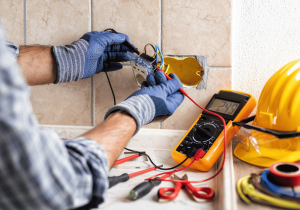As a homeowner, it’s your responsibility to keep your property safe and in good condition. One of the most important things you need to do is to make sure your electrical systems are working properly. Electrical defects can be dangerous and can cause accidents or fires that put your family’s safety at risk. In this post, we’ll discuss some of the most common electrical defects in homes so you can identify and address them promptly.
Inspecting Your Home For Electrical Hazards
Faulty Wiring
 Faulty wiring is one of the most common electrical defects in homes. Over time, wiring can become damaged as a result of wear and tear, pests chewing through it, or improper installation. You may notice flickering lights, discolored electrical outlets or switches, or a burning smell. These should be taken care of immediately by a licensed electrician.
Faulty wiring is one of the most common electrical defects in homes. Over time, wiring can become damaged as a result of wear and tear, pests chewing through it, or improper installation. You may notice flickering lights, discolored electrical outlets or switches, or a burning smell. These should be taken care of immediately by a licensed electrician.
Overloaded Circuits
Electrical circuits are designed to handle a certain amount of electricity. However, when too many appliances are plugged in at once, or when an appliance draws too much power, the circuit can become overloaded. Signs of overload include tripping circuit breakers or blowing fuses. This can pose a fire hazard and requires prompt attention from a professional.
Outdated Electrical Panels
If your home has an old electrical panel, it may not be able to handle the electrical loads of modern appliances, leaving your family at risk for fire and electrical hazards. Signs of outdated electrical panels include circuit breakers tripping often or regularly, blown fuses, and burning smells. Replacing an outdated panel is a major job and should be done by a licensed electrician.
Grounding Issues
Grounding means providing a safe path for electrical currents to flow in the event of a fault. Homes built before 1960 may not have grounded electrical outlets. It’s important to upgrade to a grounded system as they protect you and your family from electrocutions. Grounding issues can also cause appliances to malfunction, creating a fire hazard.
Overheating Appliances
 Overheating appliances are a common cause of electrical fires in homes. The warning signs include appliances that feel hot or have a burning smell; frayed or damaged cords and plugs; and outlets or light switch covers that feel hot. Keep your appliances well-maintained to prevent the risk of overheating.
Overheating appliances are a common cause of electrical fires in homes. The warning signs include appliances that feel hot or have a burning smell; frayed or damaged cords and plugs; and outlets or light switch covers that feel hot. Keep your appliances well-maintained to prevent the risk of overheating.
Taking care of electrical defects in your home is important to protect your family’s safety and your property. Keep an eye on any unusual behavior in your electrical systems, and address them immediately by hiring a licensed electrician. Remember, prevention is key when it comes to electrical hazards.

